by Lisa Cooke | May 28, 2016 | 01 What's New, Publishing, Social Media, Writing Family History
Want to record your personal history but never seem to have the time? Turn Facebook posts into a book with this nifty service. It’s journaling for the twenty-first 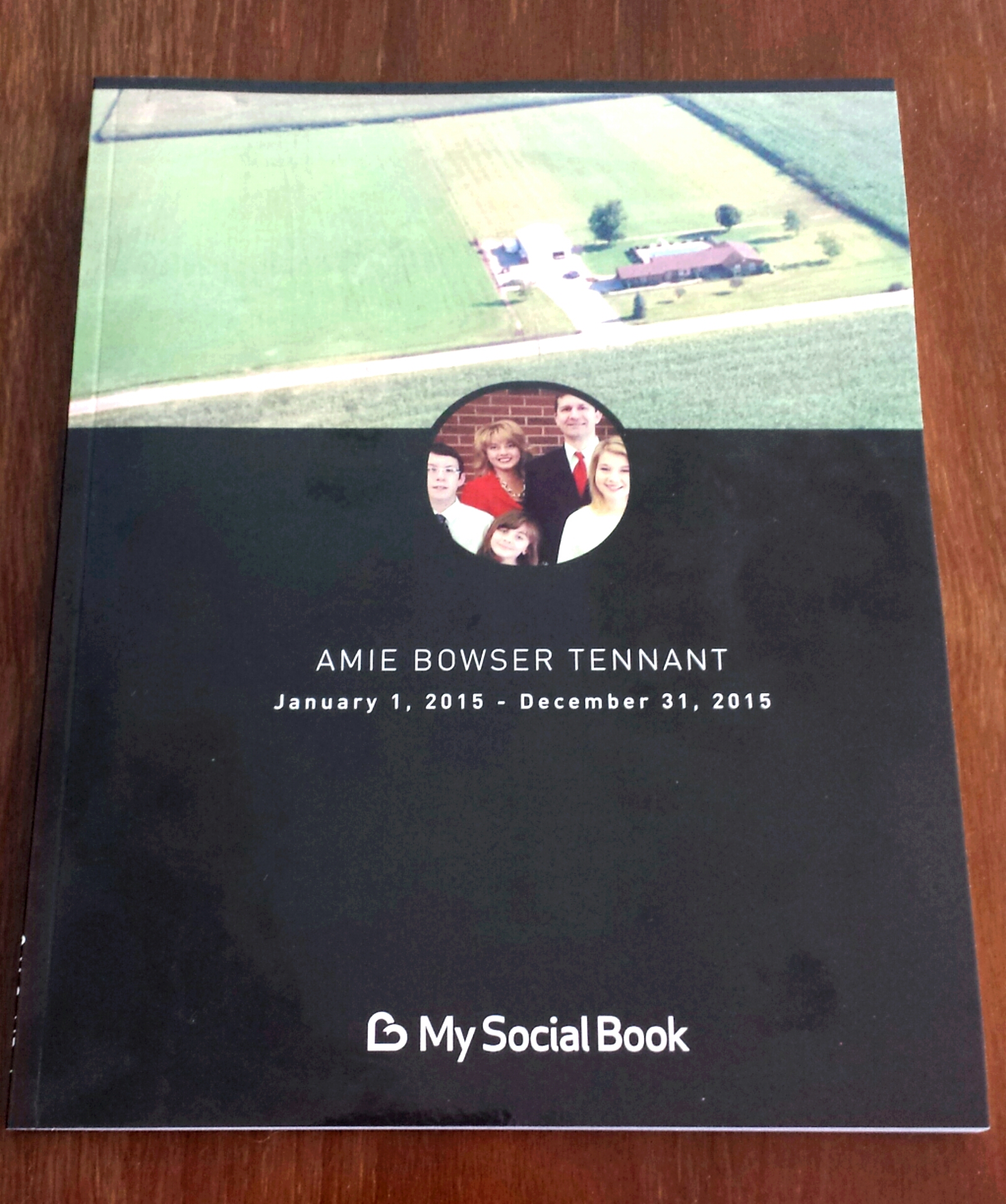 century!
century!
As a teenager, I was an avid journal writer. Now, it’s just one more thing I feel guilty about not doing regularly. But I have recently found an easy and effective solution: My Social Book.
Many of us already use Facebook to share the kinds of events we want to record, such as a grandchild’s kindergarten graduation, a weekend getaway, or a dinner out with friends. My Social Book will turn your Facebook posts into a book–complete with pictures and comments from your friends and family.
My Social Book.com slurps your Facebook statuses, comments, and photos and prints them as a lovely keepsake journal. In this context, slurping refers to an app or website “sucking” your content onto a new site with your permission. It is a wonderful tool.
Here’s How to Turn Facebook Posts into a Book
First, go to My Social Book.com and click “Start your book now.” Next, you will be able to edit your content by date and by posts. (If you want to leave out that silly post you made about your recent ailment, you can do that!)
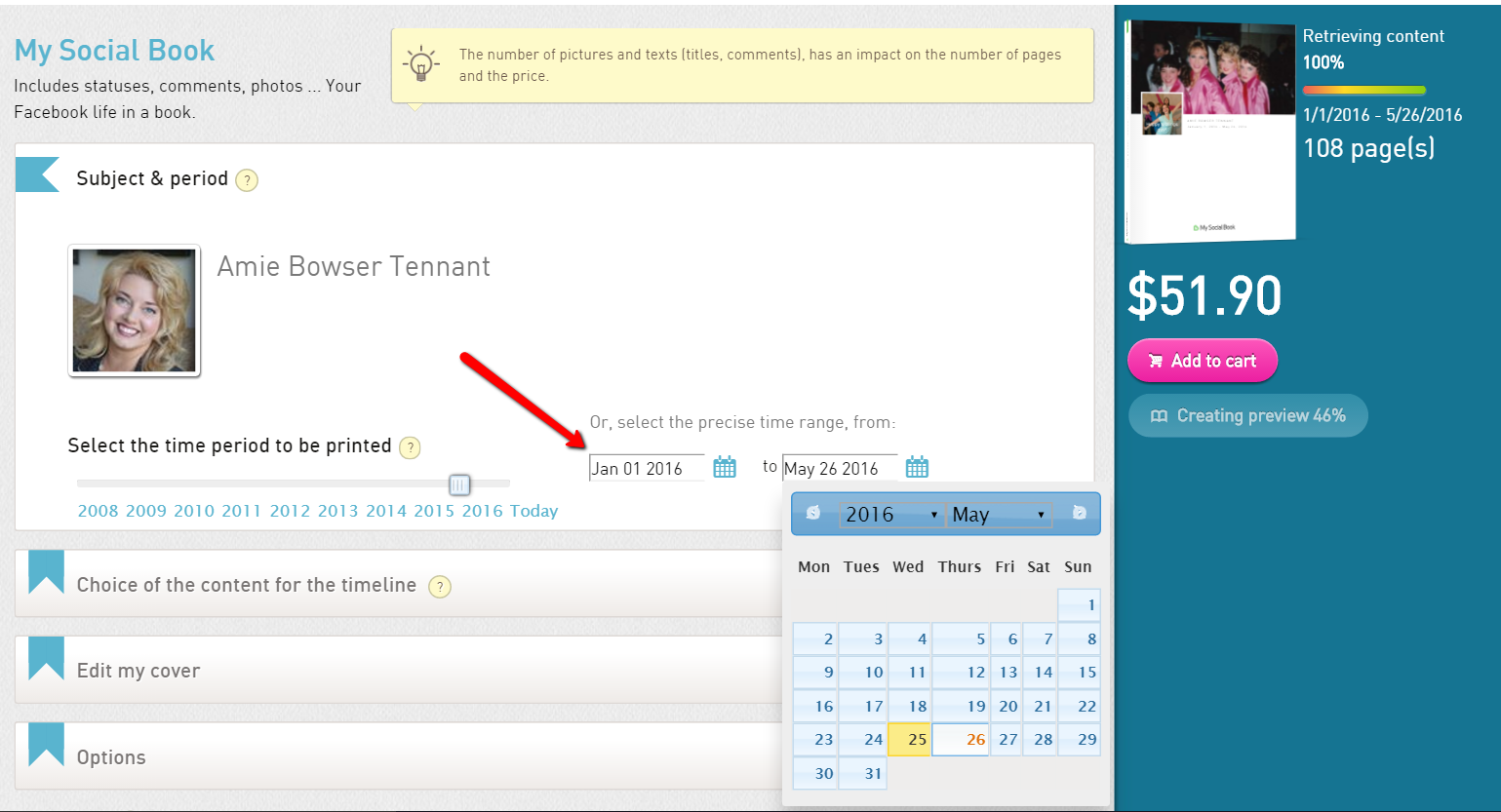
Choose from 16 different book cover colors and choose a soft or hard cover. When you are done, click “See inside” for a look at several of the personalized pages in your book. The final cost depends on the number of pages you included and your cover choice. My soft cover book with 108 pages cost $51.90. There is a small shipping and handling fee. (Tip: Google MySocialBook Coupon for free shipping and discounted prices on your first purchase.)
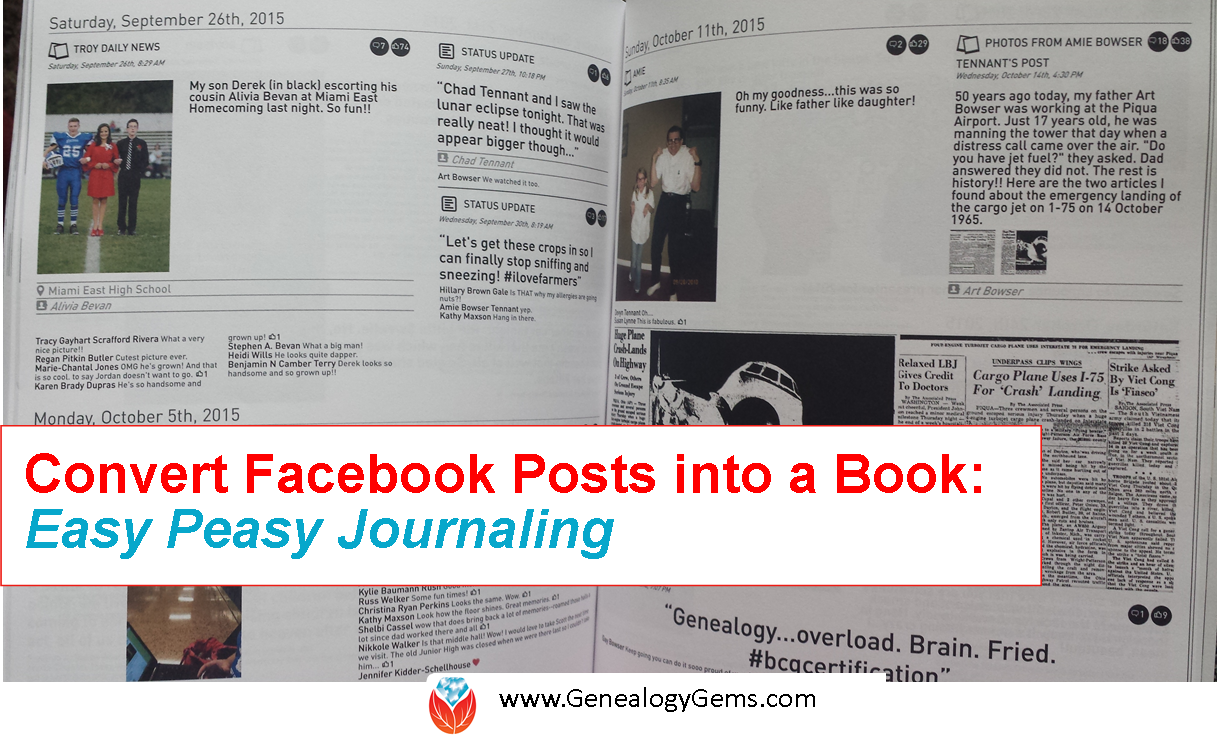 I was delighted with the book I ordered. I plan on ordering one each year. It was fun to read back over the year, see the pictures, and read the comments of my friends and loved ones. I think it will make a wonderful reading addition to the coffee table!
I was delighted with the book I ordered. I plan on ordering one each year. It was fun to read back over the year, see the pictures, and read the comments of my friends and loved ones. I think it will make a wonderful reading addition to the coffee table!
As a little side note, a friend of my mine passed away last year. I had forgotten how often she posted comments on my Facebook posts. It was a nice little reminder of her and I thought how neat it is to have the comments of our loved ones recorded in this way.
Don’t let another year go by without capturing your own personal history back from Facebook! My Social Book is a great answer to making time to keep a journal again.
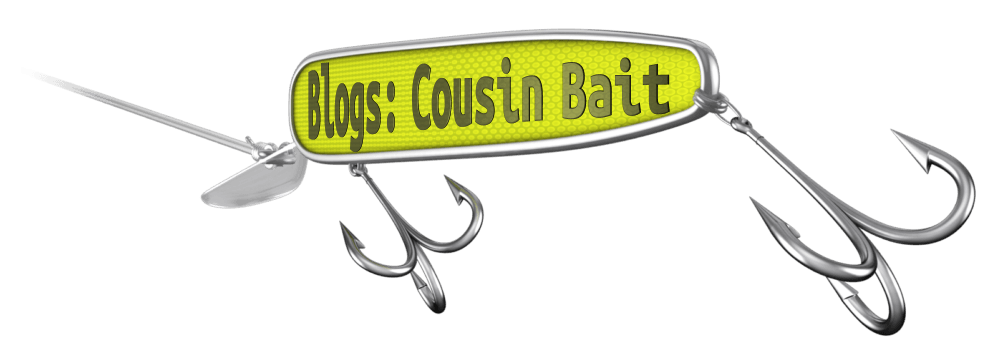 More Gems on Writing Family History
More Gems on Writing Family History
WHY and HOW to Start a Family History Blog
Easy Project to Write Your Family History
Famicity: A New Way to Gather and Share Family Stories
by Lisa Cooke | Sep 17, 2015 | 01 What's New, History, images, United States, YouTube
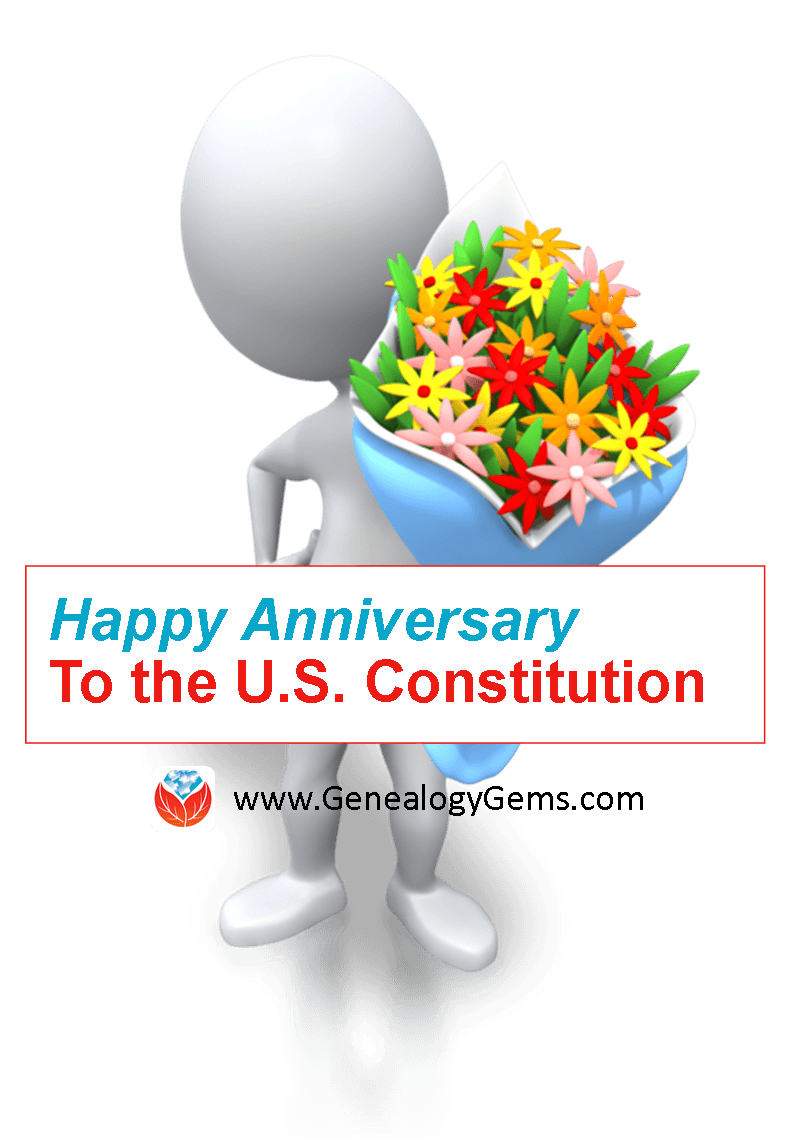 Today is Constitution Day: the 228th anniversary of the signing of the U.S. Constitution. The National Archives is celebrating with free programs and a special Family Day.
Today is Constitution Day: the 228th anniversary of the signing of the U.S. Constitution. The National Archives is celebrating with free programs and a special Family Day.
Most of us won’t be able to attend in person, but the National Archives will be webcasting several of its free public programs live on the National Archives YouTube Channel. These include:
Our Lost Constitution: The Willful Subversion of America’s Founding Document. Thursday, September 17, 12 pm. “Senator Mike Lee (R-UT) tells dramatic, little-known stories behind six of the Constitution’s most indispensable provisions and explains why some of today’s issues are the direct result of how the courts, Congress, and the executive branch have minimized or ignored them. A book signing will follow the program.”
The Young Madisons: Why a New Generation Is Standing Up for the Constitution. Thursday, September 17, 7 pm. “A rising generation of civic leaders, shaped by the digital revolution, is reaffirming its commitment to the rights-based principles of the U.S. Constitution. The ninth annual State of the Constitution Lecture at the National Archives…focuses on the voices of young leaders in the spheres of policy, governance, and citizen engagement who are shaping America’s future as a constitutional democracy.”
The Constitution: An Introduction. Wednesday, September 30, 12 pm. “Practically every aspect of American life is shaped by the Constitution….Yet most of us know surprisingly little about the Constitution itself. In his book The Constitution, professor Michael S. Paulsen, one of the nation’s leading scholars of constitutional interpretation, has written a lively introduction to the supreme law of the United States, covering the Constitution’s history and meaning in clear, accessible terms, and provides us with the tools to think critically and independently about constitutional issues.”
More on the U.S. Constitution from the National Archives:
Will you be in town that day? Here’s what you should know:
- The original U.S. Constitution is on permanent display in the National Archives. Museum hours are 11:30 a.m. to 5:30 p.m. due to a morning naturalization ceremony (which is not open to the public).
- Programs will be held in the William G. McGowan Theater, unless otherwise noted. Attendees should use the Special Events entrance on Constitution Avenue at 7th Street, NW. Metro accessible on the Yellow and Green lines, Archives/Navy Memorial/Penn Quarter station.
- FAMILY DAY: Between 1-4 pm in the Boeing Learning center there will be special hands-on activities for families and children.
- Advance registration is required for the free program “The Young Madisons.”
More Resources
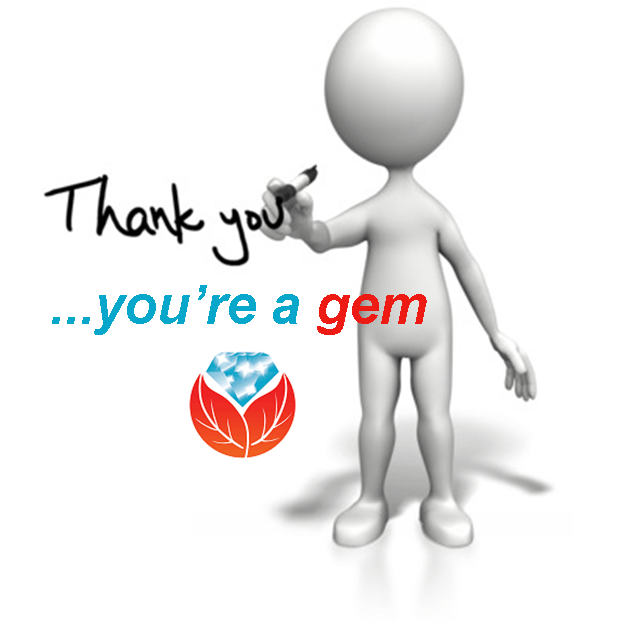 Sometimes we recommend resources available through ShopFamilyTree, Amazon and other affiliates. If you decide to purchase these, thank you for using our links which supports the free Genealogy Gems blog and podcast!
Sometimes we recommend resources available through ShopFamilyTree, Amazon and other affiliates. If you decide to purchase these, thank you for using our links which supports the free Genealogy Gems blog and podcast!
by Lisa Cooke | Jan 4, 2017 | 01 What's New, Conferences
Follow me, Lisa Louise Cooke, in 2017 as I share Google research techniques, newspaper research for genealogy, finding living relatives, and much more. I’ll be in Florida in February – here’s the scoop!
The Annual Pinellas Genealogy Society Seminar, co-sponsored by the Largo Public Library, is scheduled for 25 February 2017 at the Largo Public Library from 8 am to 4 pm. The library is located at 120 Central Park Drive, Largo, FL.
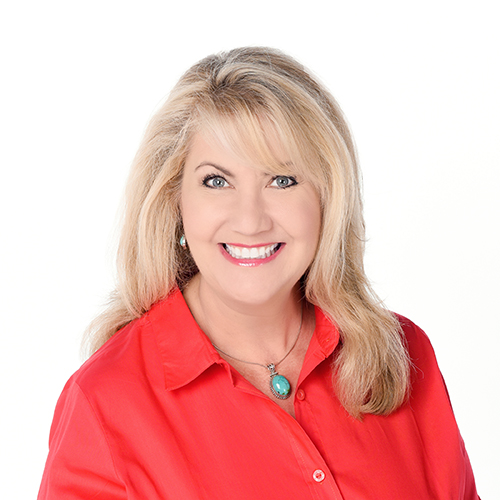 I will be the featured speaker, in addition to three great breakout speakers. My four presentations are:
I will be the featured speaker, in addition to three great breakout speakers. My four presentations are:
1. Google Tools and Procedures for Solving Family History Mysteries
2. Getting the Scoop on Your Ancestors with Newspapers
3. Nine Strategies for Finding Living Relatives
4. Future Technology and Genealogy – 5 Strategies You Need
The topics of the breakout sessions will be (1) “How Do I Organize My Genealogy Records?” by Debbe Hagner, (2) “What’s New at FamilySearch.org with Focus on ‘Memories’” by Debra Fleming, and (3) “English & Welsh Family History: Useful Online Research Resources” by Liz Pearson.
In addition to the speakers, this event boasts a continental breakfast, box lunch, raffles, door prizes, huge book sale, and plenty of time to network with guest organizations and other researchers. The all-inclusive registration fee is $40 for PGS members and $45 for non-members. After 18 February, the cost is $50, so register early.
What: The Annual Pinellas Genealogy Society Seminar co-sponsored by the Largo Public Library
When: Saturday, 25 February 2017, from 8 am to 4 pm
Where: The Largo Public Library at 120 Central Park Drive, Largo, FL.

A detailed schedule of events and a registration form are found at http://www.flpgs.org/NMbrs/seminar/2017/Sem17.aspx . Questions can be addressed to pgsfla@yahoo.com.
My entire lecture schedule for 2017 can be viewed here. I hope to meet with many of you as you pursue genealogy greatness this new year!
by Lisa Cooke | Dec 5, 2016 | 01 What's New, Research Skills, Travel
We love the ease with which we can search online, but a genealogy research trip can offer exceptional and unique rewards. If you have been apprehensive about visiting a courthouse or archive, follow our 4 step plan for a successful genealogy research trip that could lead to your own amazing discovery!
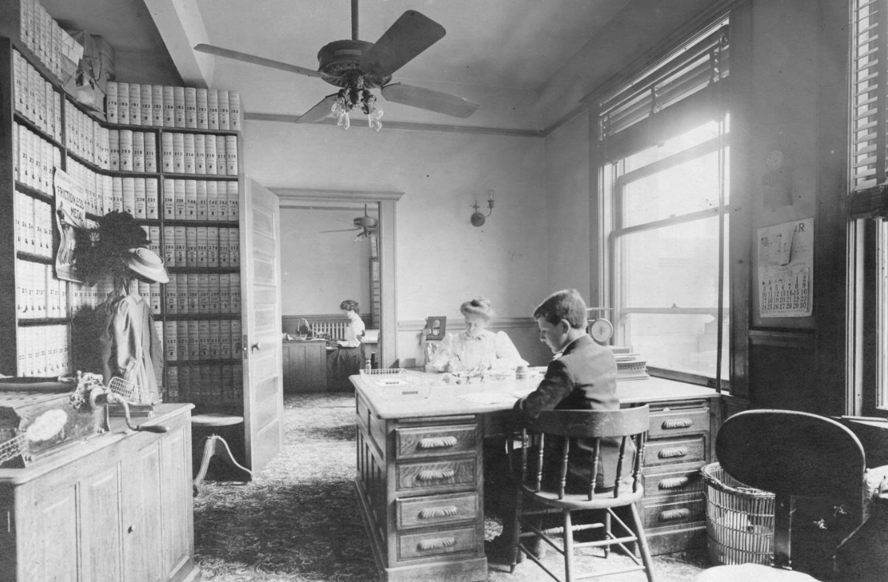
By J. D. Cress [Public domain], via Wikimedia Commons
In my genealogy world, if an answer can’t be found on one of my favorite genealogy website repositories (like FamilySearch, Ancestry, or Findmypast) then a quick Google search usually does the trick.
However, we new genealogists of the Internet era may be banking on the fact that “everything” we need is online. This is obviously not true. In fact, many local libraries and archives are under-staffed and under-funded making digitizing of their holdings difficult. This is why making a genealogy research trip is a really good idea.
The Unprepared Genealogy Research Trip
Several years ago, I made my first research trip. I was woefully unprepared. On a whim, I drove three hours on a weekday to “go to the courthouse.” I arrived at lunch time…and it was closed for an hour. Sigh. However, a nice receptionist sugg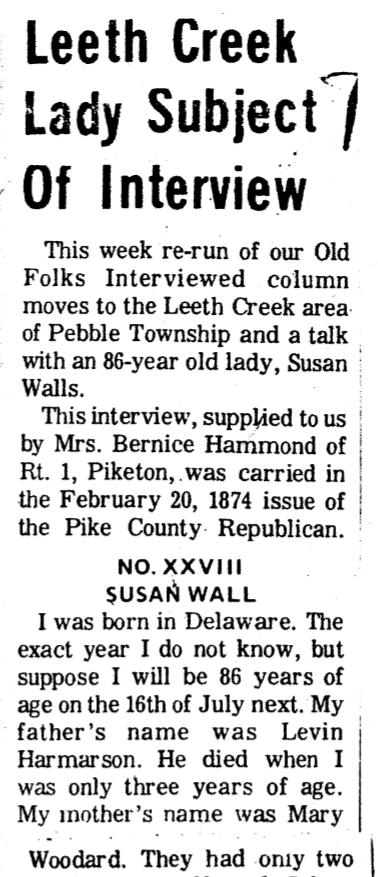 ested I go to the local public library just down the street.
ested I go to the local public library just down the street.
When I arrived at the tiny corner building, I asked at the circulation desk for the history department. She seemed a little taken back, but said, “We have a little room in the basement with some local history and genealogy things.” Note to self: not all libraries are large enough for a “history department.”
In the basement room, no one was on duty, but a nicely printed instruction sheet of what was available and how to use their files laid on the table. “I guess I just dig in,” I thought, and off I went.
Though this was my first genealogy research trip, it proved to be very fruitful. In a scrapbook simply titled “Walls Family,” I found a Xerox
copy of an article from an 1874 newspaper. In this article, my fourth great-grandmother (Susannah Harmarson Walls) had been interviewed because she was the oldest living woman in the township. Her interview began, “I was born in Delaware. The exact year, I do not know, but I suppose I will be 86 years of age on the 16th of July next. My father’s name was Levin Harmarson. He died when I was only three years of age. My mother’s name was Mary Woodard.”
The interview included the story of her mother re-marrying, the family leaving Delaware for Wheeling, Virginia, and she marrying her step-brother there. Then, they traveled on into Scioto County, Ohio. She named each of her eleven children and their spouses.
The information in this one interview was particularly helpful. Before this, we had no idea when or where Susannah and Levi married, and finding the spouses of their children had proved difficult!
Though this was an amazing find, I wonder what other records, items, or photographs I might have dug up had I prepared ahead of time. Perhaps, I would have had time to dig more into their microfilm holdings, archived pictures, atlases, or even had time to go to the local cemetery.
The Prepared Genealogy Research Trip
Fast forward several years and I am making much more prepared genealogy research trips. Get the most from your next genealogy research trip by following these 4 important steps:
1. Run a Narrative Report. Start creating your genealogy research trip plan by printing out a narrative report of your targeted family line. This can be done with the reports feature found in genealogy database programs like RootsMagic.
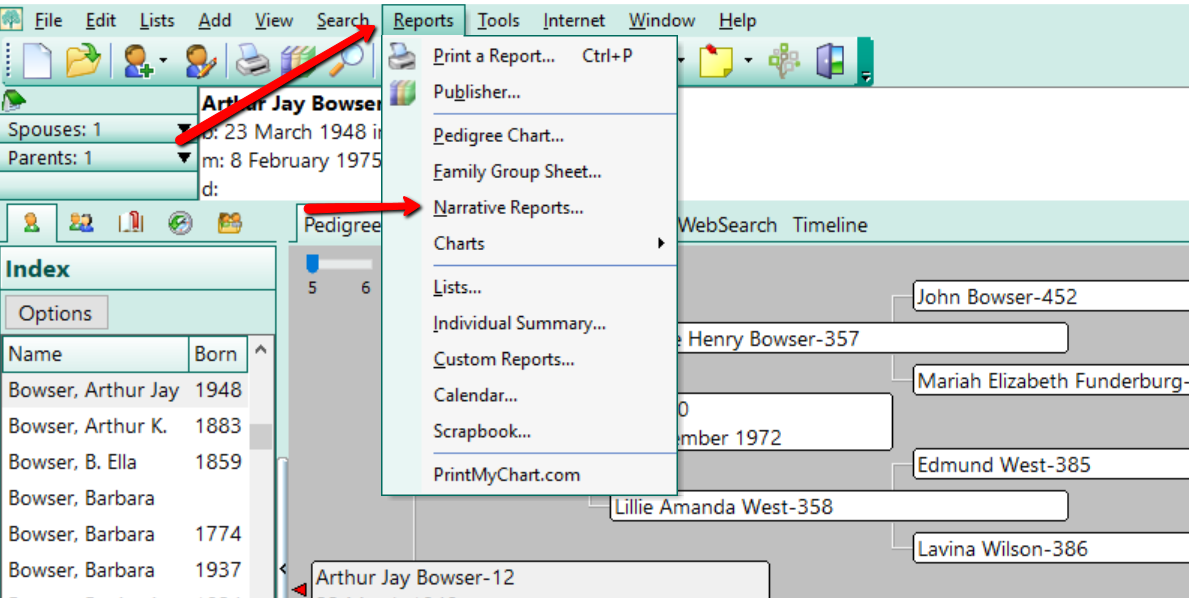
2. Look for holes in your research. Carefully read through the report looking for holes in your research or where you may be missing a source. In this case, a “hole in your research,” may be the missing marriage date of a couple, or the missing birth date of a child. Circle these “holes” and make a list of what the needed piece of information is to correct it and where you can find it.
Example: Clark County, Ohio. Need a death date for Edmund West. County didn’t keep death records that early. Likely died between 1830-1840. Check probate record books, estate files, tax records, cemetery records, and tombstones at Wilson Cemetery.
Maybe you have a birth date, but no source. A source is the proof of a particular fact. For example, a good source for a birth date is a birth register or even a marriage record. If you are lacking sources for your genealogy facts or are not sure how to begin sourcing your genealogy, learn more about that here.
3. Decide what repositories you will need to visit. After creating your list, determine where these items are held by asking yourself important questions, such as: Will I need to visit the courthouse, a library, an archive, cemetery, or all the above? Which location will produce the most results? Should I visit the archives first, or the courthouse?
4. Contact each repository ahead of time. Finding out the days and times when each of these places is open before you go is a must! Try to pick a day when all, or most, of the places are open so that you can get a lot done. If this isn’t possible, consider making an extended stay overnight to accomplish your goals.
Keep in mind that not all websites are up-to-date. Just because the library says it is open from 10 to 5 every day but Sunday on the webpage doesn’t necessarily mean that is still the case. Always call each establishment to verify days and hours of operation.
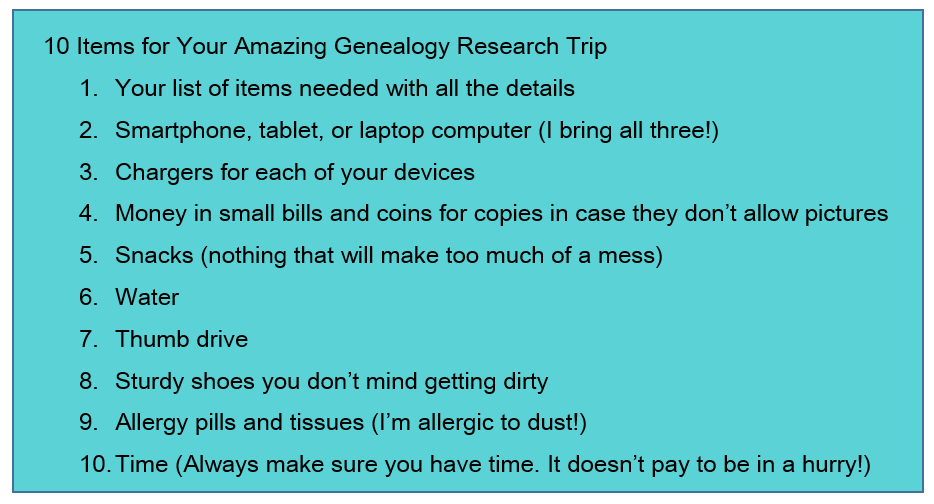
Remember, there are newspapers, maps, documents, and pictures just waiting to be uncovered. By thinking about what you want to achieve while on your trip and what information you need to find and where, your genealogy research trip can be a successful one. Happy hunting!
More on Genealogy Research Trips
Still feeling unmotivated to get on the road, read or listen to these features for inspiring tips to make a courthouse records research trip in your near future!
Courthouse Records Research Trip
Premium Podcast Episode 126 – Road Trips for Genealogy
Premium Video – Using Evernote to Create a Genealogy Research Plan
 century!
century!
 I was delighted with the book I ordered. I plan on ordering one each year. It was fun to read back over the year, see the pictures, and read the comments of my friends and loved ones. I think it will make a wonderful reading addition to the coffee table!
I was delighted with the book I ordered. I plan on ordering one each year. It was fun to read back over the year, see the pictures, and read the comments of my friends and loved ones. I think it will make a wonderful reading addition to the coffee table! More Gems on Writing Family History
More Gems on Writing Family History

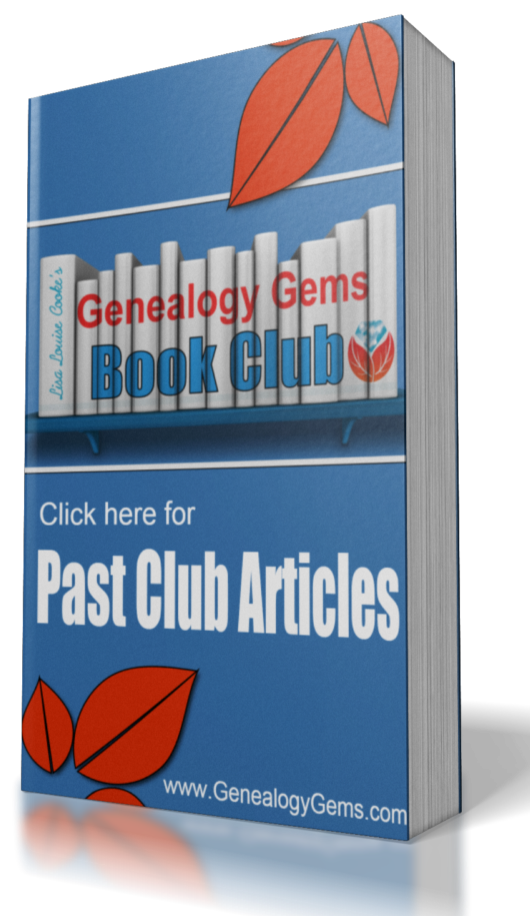

 I will be the featured speaker, in addition to three great breakout speakers. My four presentations are:
I will be the featured speaker, in addition to three great breakout speakers. My four presentations are:

 ested I go to the local public library just down the street.
ested I go to the local public library just down the street.

